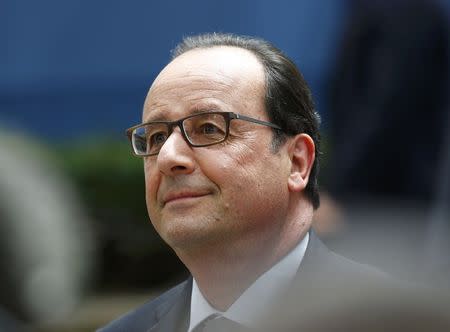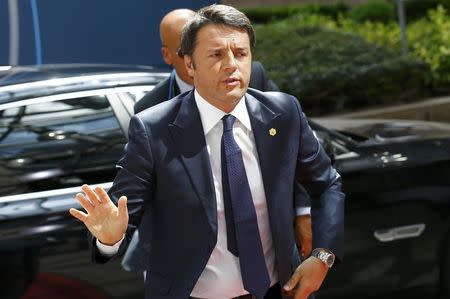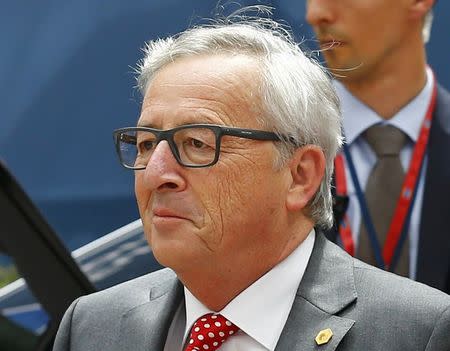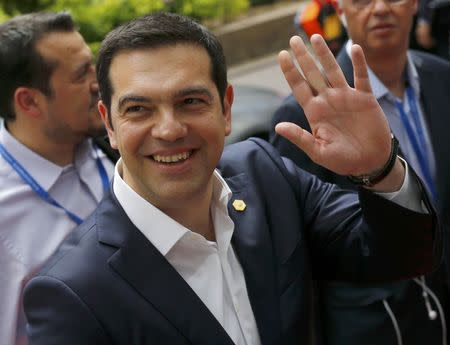Migration plan exposes EU rifts, tough bargaining ahead
By Alastair Macdonald BRUSSELS (Reuters) - Hours of late-night squabbling in Europe's highest council of state left EU leaders licking political wounds on Friday and preparing for weeks of hard bargaining over a plan to cope with a flood of migrants from the south. German Chancellor Angela Merkel called finding a common EU solution to the hundreds of thousands fleeing by sea and land from Africa and the Middle East the "biggest challenge" Europe had faced in her decade in power - greater than the Greek and wider euro zone debt crises and Russian action against Ukraine. Donald Tusk, the former Polish premier who chaired the two-day European Council in Brussels, echoed that, saying he could recall few other EU summits that had been more difficult. Migration is fuelling public hostility to open borders and to the EU project as a whole, even as many recognise a need for immigration to support their ageing populations. How leaders reconcile competing national interests to deal with a problem they agree needs a joint response may prove a defining moment. "This will be the transformative issue for the Union for the next decade," one senior EU diplomat said. The summit came two months after the deaths of about 800 people on a single boat headed for Italy. It exposed sharp differences between Mediterranean states, notably Italy, which have borne the brunt of growing numbers of refugees and economic migrants, and poorer ex-Communist countries in the east, who feared costs and disruption from EU proposals to force them to take in a share of those in transit. It also strained the institutional architecture of the bloc, with member states furious at a move by Jean-Claude Juncker, who heads the executive European Commission, to set mandatory quotas for governments to take in a share of 40,000 Syrian and Eritrean refugees now being housed in Italy and Greece. SHARP EXCHANGES Tension came to a head around the summit room near midnight on Thursday in sharp exchanges between Juncker, a veteran prime minister of Luxembourg, and Tusk, whose job is to broker common positions among the 28 national leaders in the European Council. The two men, both in office since late last year, dismissed any personal conflict in joint news conferences. Both differ from their predecessors by a more forthright style in pushing their institutional power without waiting for EU consensus. Juncker, wearied by a week of round-the-clock talks on the Greek debt crisis, admitted to an outburst of undiplomatic language but insisted his "I don't give a damn" referred only to details of how to share out burdens. At issue was whether states would take a share of those to be cared for while asylum claims are processed under a system of binding quotas imposed from Brussels, or whether a voluntary set of national pledges would suffice. While the two-year measure is explicitly temporary, opponents feared the calculation of quotas in Brussels would set a precedent for a longer-term programme to come later. Italian Prime Minister Matteo Renzi supported the Commission proposals, which were put forward, with a measure of defiance, after leaders explicitly called for a voluntary scheme in April. However, like Juncker, Renzi said he was pleased that the summit had committed itself to meet the target on a voluntary basis. "Europe should not just be about budget controls," he said. "In an emergency, it must display solidarity not self-interest." Some countries will not take part in the system, notably Britain, where Prime Minister David Cameron used the summit to launch negotiations on reforms he says he needs to persuade voters to back staying in the bloc at a coming referendum. London has a long-standing exemption from EU rules on border issues, along with Ireland and Denmark. Leaders also agreed to excuse Hungary, which faces its own migrant crisis from the Balkans, as well as Bulgaria. "THE FOUR HORSEMEN" Quite how the voluntary pledging scheme will work is unclear. It is supposed to be complete by the end of July but one senior EU official said he thought it could take longer. Governments are under pressure, however, not to be seen to shirk as people continue to die in the Mediterranean. Some eastern states already indicated they will offer to take in more migrants on a voluntary basis than they would have accepted had Brussels tried to impose it as an obligation. "We want to be treated with respect and let us show our solidarity - but not enforced," Lithuanian President Dalia Grybauskaite, a vocal opponent of quotas, told reporters. Some senior officials see a move toward a less voluntary system of distribution in years to come. They point to leaders' other initiatives on migration at the summit as necessary to overcoming resistance to that in some countries by reassuring governments that the overall European problem can be contained. They called for swifter deportation of illegal, economic migrants and offered help and incentives for African countries to curb the exodus of their citizens. For Rem Korteweg of the Centre for European Reform, the summit was a setback for Europe. He cited migration, along with the Greek debt crisis, confrontation with Russia and British threats to leave as the "Four Horsemen" circling the summit. Forecasting "very heated" talks this summer as Italy urges its neighbours to meet the target, Korteweg said: "This damages the EU as a whole because it shows that solidarity is lacking and most member states don't want to share Italy's burden." (Editing by Andrew Heavens)





